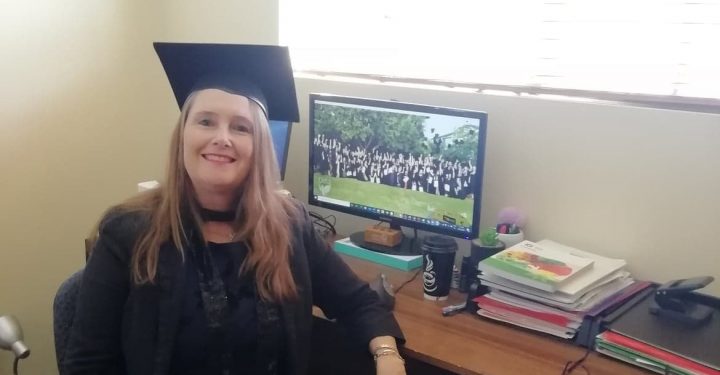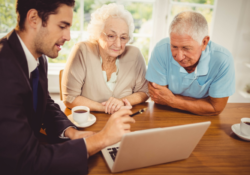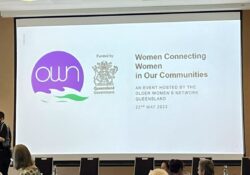
We congratulate our Project Support Officer Karen Wilson on graduating and receiving her BSc Psychology (Honours) degree from USQ last week. Pictured is Karen celebrating her graduation virtually.
During her studies she completed a qualitative thesis project with Dr Jan du Preez, which explored the question “how do public libraries support older women to stay active and socially connected within their communities as they age?. The project was supported by the Moreton Bay Regional Libraries.
Five women aged 65-74 years, who live alone and regularly participate in local library programs and activities were recruited and interviewed. Data from audio-recorded, semi-structured interviews were transcribed and analysed using Interpretative Phenomenological Analysis. Four themes emerged of older women’s experiences of public libraries: (a) a gateway to knowledge and information; (b) a hub that promotes a sense of belonging and connectedness; (c) a space that promotes inclusivity and diversity, and (d) an enabler of self-reflection and reappraisal of self, needs and goals.
Participants’ experiences of the library as a gateway to knowledge and information are consistent with the research (AIHW, 2018; Bundy, 2005; Davis & Finch, 2018; Everingham et al., 2009; Joseph, 2006; McCallum, et al., 2017; Norman, 2012; Office of the eSafety Commissioner, 2017; O’Hehir & Reynolds, 2015; Williamson et al., 2006; Williamson, 2009). Libraries provide information in diverse formats and keep older women informed about what is happening within the library, their communities and further afield. Currently older women can choose their level of engagement with digital technology, but as technology becomes ever more pervasive this may change to the detriment of some. Libraries can support older women through major life transitions by providing age-related health information, possibly in partnership with local health providers (Norman, 2012).
Participants’ experiences of the library as a hub that promotes a sense of belonging and connectedness are consistent with the literature (Bundy, 2005; Davis & Finch, 2018; Joseph, 2006; O’Hehir & Reynolds, 2015; Sloan, 2009; Vincent, 2014; Williamson et al., 2006; Williamson, 2009). Libraries provide a safe and comfortable space for older women to spend time; either alone or with family, friends and peers; or through participation in programs and activities. Libraries support older women by connecting them to the community or bringing the community to them, facilitate lifelong learning, and are well placed to partner with community organisations.
Participants’ experiences of the library as a space that promotes inclusivity and diversity also reflects the literature (Davis & Finch, 2018; Jones, 2006; Joseph, 2006; McCosker et al., 2018; O’Hehir & Reynolds, 2015; Williamson et al., 2006; Williamson, 2009; Wyatt et al., 2015). Libraries are a place for all ages, interests and abilities and are gradually integrating cultural activities into their programs. They are welcoming, affordable, accessible community hubs for reading, watching movies on iPads, participating in programs and activities, or enjoying coffee with peers. There were some disparities between regional and rural libraries in terms of provision of programs and activities, which partly related to lack of space. Libraries also support those with disabilities and provide spaces for intergenerational activities.
Participants experiences of the library as an enabler of self-reflection and reappraisal of self, needs and goals was an interesting finding. Self-reflection provides older women with an opportunity to reappraise the library’s important role in supporting them through major life transitions. Borrowing books and reading about other women’s experiences can provide self-help tools to support older women through life’s adversities. Self-reflections may also lead to older women reappraising the library as a place that supports them to stay active and socially connected as they age, through the provision of age-related health information and links to community support networks.
Participants’ experiences highlighted the valuable role the library can play in supporting older women to stay active and socially connected within their communities as they age. This supports Cornwell et al. (2008) and Soulsby and Bennett (2015) who found that some older adults who remain socially active through adverse life events, may be resilient to the potentially isolating events of retirement and bereavement. As cited by beyondblue in their “Connections Matter” guide to helping older people stay socially active, “strong ties with family, friends and the community serve as protective factors, leading to happiness, security, support and a sense of purpose” (p. 2). As sociodemographic and life course factors can leave older women at increased risk of experiencing loneliness and social isolation, it is important that consideration is given to future funding, partnership working and promoting the value of the library to the community. This is consistent with Davis and Finch (2018) regarding the future direction of Queensland libraries, and Norman (2012) who highlighted the critical need for evaluation and evidenced-based practice, which he argued is central to meeting the community’s changing needs. These findings may provide valuable insights to inform future research and influence local age-friendly agendas.
If you would like further information about this study please email Karen at karen.wilson@cotaqld.org.au


